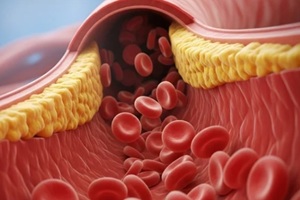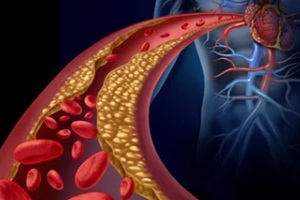 High cholesterol usually offers no warning signs. In fact, this waxy substance can build up in your blood vessels for years without any noticeable symptoms. So, it’s important to understand why high cholesterol stays hidden and why regular testing is essential for preventing heart attacks and strokes.
High cholesterol usually offers no warning signs. In fact, this waxy substance can build up in your blood vessels for years without any noticeable symptoms. So, it’s important to understand why high cholesterol stays hidden and why regular testing is essential for preventing heart attacks and strokes.
High Cholesterol Develops Without Warning Signs
You cannot tell if your cholesterol levels are elevated based on how you feel. High cholesterol often produces no symptoms to alert you to the serious problem developing inside your arteries. Marathon runners and individuals with healthy diets can still have dangerously elevated cholesterol without realizing it.
The only way to discover if you have high cholesterol is to have your blood drawn and a lipid panel performed, which calculates the levels of total cholesterol, LDL cholesterol, HDL cholesterol, and triglycerides in your blood. Your healthcare provider uses these specific numbers to determine whether your levels fall within healthy ranges.
Many people discover they have high cholesterol when they visit their healthcare provider for a routine checkup. Others find out when they develop complications, such as chest pain or have a heart attack. By this time, cholesterol has already been building up in their arteries for months or years without any warning.
Why High Cholesterol Stays Hidden
Your body needs some cholesterol to build healthy cells and produce hormones. When you have too much cholesterol, the excess amounts don’t always cause noticeable pain or discomfort. Instead, these extra fats start sticking to your artery walls as plaque.
This plaque formation happens slowly over many years. Your arteries keep working normally while plaque gradually builds up inside them. Your heart and blood vessels strain to maintain blood flow as arteries begin to narrow. This compensation prevents you from feeling symptoms until the blockages become severe or a piece of plaque breaks off and forms a blood clot.
The Silent Buildup Process Creates Serious Risks
High cholesterol becomes dangerous because it operates without symptoms. While you feel perfectly fine, cholesterol and other substances combine to form plaque deposits in your arteries. Doctors call this condition atherosclerosis.
The plaque buildup narrows your arteries and reduces blood flow to your heart, brain, and other organs. Eventually, this plaque can completely obstruct blood vessels or break apart and form clots. When this happens, your first symptom may be a heart attack or stroke.
The longer high cholesterol goes undetected, the more plaque accumulates in your arteries. This silent progression explains why regular cholesterol screening becomes so important for preventing serious complications.
Age and Screening Recommendations
 High cholesterol can develop at any age. Children as young as nine can have elevated levels. Current medical guidelines recommend cholesterol screening starting at age nine, with follow-up testing every five years.
High cholesterol can develop at any age. Children as young as nine can have elevated levels. Current medical guidelines recommend cholesterol screening starting at age nine, with follow-up testing every five years.
Men should get tested every five years until they turn 45, and then every year or two until 65. After you turn 65, you should undergo annual check-ups. Women follow similar patterns, with increased frequency starting at age 55.
You need more frequent testing if heart or high cholesterol runs in your family. These individual risk factors help your healthcare provider determine your specific screening schedule.
Risk Factors Increase Your Chances
Several factors raise your likelihood of experiencing high cholesterol. Your eating habits play a significant role. Consuming foods high in saturated and trans fats can raise your cholesterol levels. These include processed foods, fatty meat products, and full-fat dairy.
Lack of physical activity also negatively impacts cholesterol levels. Exercise helps boost your “good” HDL cholesterol levels. Smoking has many adverse effects, including reducing the level of HDL cholesterol in your blood and causing damage to your blood vessels. Likewise, consuming excessive alcohol can raise your total cholesterol levels.
Certain medications and medical conditions, including diabetes, hypothyroidism, chronic kidney disease, and obesity, all factor into the equation, as well.
Your genes determine much of your cholesterol risk. Familial hypercholesterolemia is a condition that you inherit and causes incredibly high cholesterol levels starting from when you are a child. If your siblings or parents have elevated cholesterol, you may need earlier screening.
Complications Develop When High Cholesterol Goes Untreated
Without treatment, high cholesterol leads to serious cardiovascular problems. You develop coronary artery disease as a result of plaque buildup in the arteries that take blood to your heart, which can result in chest pains, heart attacks, or even cardiac failure.
Carotid artery disease occurs when plaque affects the arteries that carry blood from your heart to your brain. This condition raises your risk of minor and major strokes. You end up with peripheral artery disease when that plaque accumulates in the arteries that take blood to your extremities.
High cholesterol also tends to elevate blood pressure. The plaque narrows and hardens your arteries, requiring your heart to beat harder and faster to push blood through those arteries, which increases your blood pressure.
Some People Show Rare Physical Signs
While high cholesterol typically produces no symptoms, a small number of people develop visible signs. Yellow-colored skin bumps, called xanthomas, form when fat collects under your skin and could indicate that you have extremely high cholesterol levels.
Some people with familial hypercholesterolemia develop xanthomas around their eyes or on their knuckles. However, most people with high cholesterol never develop these physical signs.
Early Detection Prevents Serious Problems
Regular cholesterol screening catches elevated levels before they cause complications. Early detection allows you to begin treatment with lifestyle changes, medications, or both. This reduces your risk of all kinds of serious cardiovascular complications, including heart attack and stroke.
 Treatment typically involves reducing the consumption of saturated fats, quitting smoking, and increasing physical activity. Some people also need cholesterol-lowering medications such as statins to achieve healthy levels.
Treatment typically involves reducing the consumption of saturated fats, quitting smoking, and increasing physical activity. Some people also need cholesterol-lowering medications such as statins to achieve healthy levels.
Rely on Imperial Center Family Medicine for Complete Cholesterol Management
Imperial Center Family Medicine provides thorough cholesterol screening and management services designed to detect elevated levels before they lead to serious cardiovascular complications. Our experienced providers work with you to develop personalized treatment plans that address your specific risk factors and health goals.
Contact us today at 919-873-4437 or schedule online to begin protecting your cardiovascular health with regular cholesterol monitoring and expert care.
